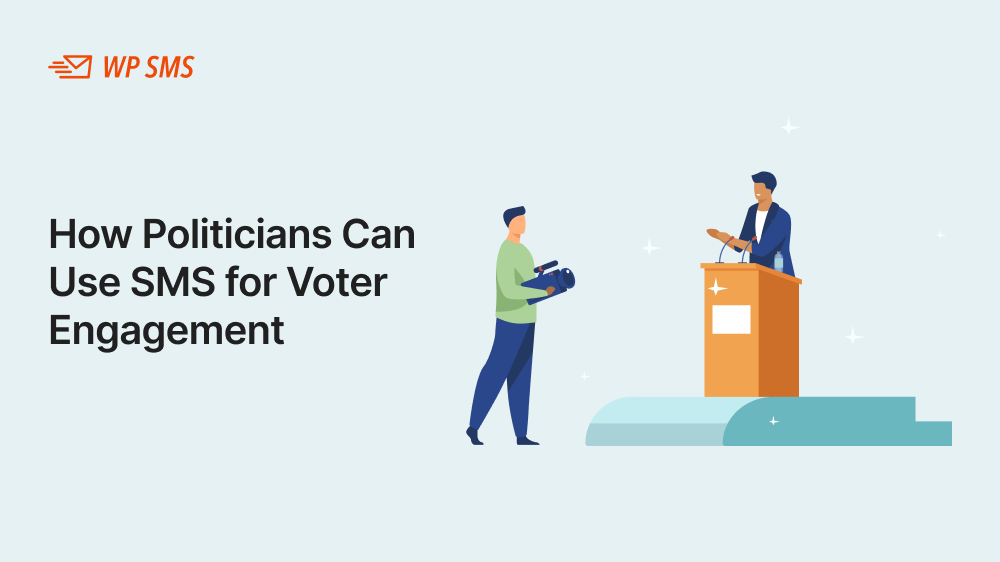SMS has become a powerful tool for political campaigns, offering a direct line to voters that cuts through the noise of social media and emails. With nearly every voter owning a mobile phone, political text messaging delivers messages instantly.
This makes political SMS campaigns ideal for urgent updates, event reminders, or last-minute calls to action. Unlike other channels, SMS works for all ages and regions, ensuring campaigns can reach diverse audiences.
For politicians, the key to effective communication lies in strategy. Campaign SMS strategies like SMS broadcast allow candidates to send bulk messages to thousands of supporters at once, perfect for sharing policy announcements or rally details.
However, successful SMS campaigns require more than just sending texts. Following SMS compliance rules—like obtaining opt-in consent—is critical to avoid legal risks. Features like SMS reminders or SMS fundraising for politicians also need careful timing and clear calls to action.
Why SMS is a Game-Changer for Political Campaigns
SMS transforms political campaigns by delivering messages directly to voters’ phones. Unlike emails or social media posts, texts have a 98% open rate, ensuring critical updates, like event details or policy announcements are seen instantly.
Political SMS campaigns work for all voters, regardless of age or internet access. This makes mobile voter outreach faster and more inclusive than traditional methods, reaching rural areas, seniors, and busy families alike.
SMS also enables real-time engagement. With SMS broadcast, candidates can send bulk messages to thousands at once, while two-way political SMS lets voters reply to ask questions or join polls.
Plus, features like SMS reminders for voting boost turnout. Combined with SMS compliance and opt-in rules, SMS builds trust by respecting voter privacy. It is not just a tool, it is a direct line to the people.
How Politicians Can Use SMS for Voter Engagement
SMS offers politicians a direct, fast, and personal way to connect with voters. By using targeted strategies, campaigns can turn texts into powerful tools for building trust and driving action.
Send Local Political SMS
Local political SMS helps candidates address community-specific issues. For example, messages can alert voters to town halls, share updates on local projects, or remind them of nearby polling locations. Using geo-targeting, campaigns ensure messages reach the right neighborhoods. This builds relevance and shows voters their concerns matter.
SMS Broadcast for Politics
SMS broadcast lets campaigns send bulk messages instantly. Use it for urgent updates, like rally cancellations or breaking policy news. Combined with political SMS compliance (opt-in lists), broadcasts keep supporters informed without feeling like spam. It is ideal for reaching large groups fast.
Two-Way Political SMS
Two-way political SMS turns texts into conversations. Voters can reply to ask questions, share feedback, or request information. For example, a voter texts “JOIN” to volunteer, and the campaign sends follow-up details. This builds engagement and makes supporters feel heard.
WP SMS plugin’s two-way messaging feature collects responses in an organized inbox, making it easy to track voter sentiment. By enabling real-time dialogue, campaigns foster trust while saving time, no manual monitoring required.
SMS Polling for Elections
SMS polling for elections gathers real-time voter opinions. Send short surveys like, “Should we prioritize healthcare? Reply YES/NO.” Quick responses help campaigns adjust messaging or policies based on voter needs. It is a low-cost way to stay aligned with public sentiment.
WP SMS plugin streamlines SMS polling. Use its segmentation tools to send polls to specific groups (e.g., undecided voters) and analyze results directly in the dashboard. The plugin’s integration with CRM systems also lets campaigns tag respondents for follow-up.
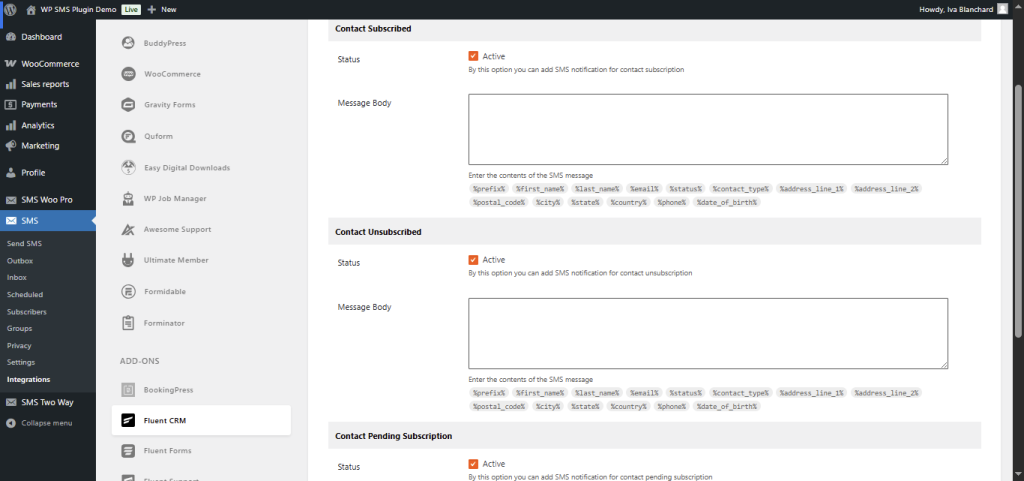
Personalized SMS for Voters
Personalized SMS for voters uses names, locations, or past interactions to make messages feel tailored.
For instance: “Maria, your Eastside polling place opens at 7 AM.” This boosts open rates and trust, as voters see the campaign understands their needs.
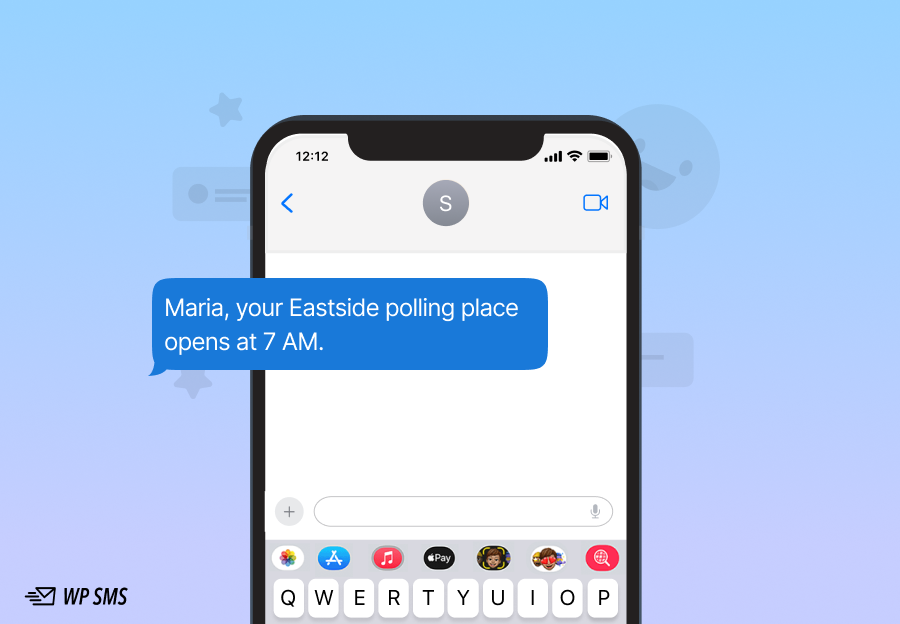
WP SMS plugin takes personalization further with dynamic fields. Automatically insert voter names, donation history, or local issues into messages.
For example: “John, you donated last month—help us hit our $5k goal!” Combined with segmentation tools, campaigns can send hyper-relevant texts to groups like first-time voters or loyal supporters.
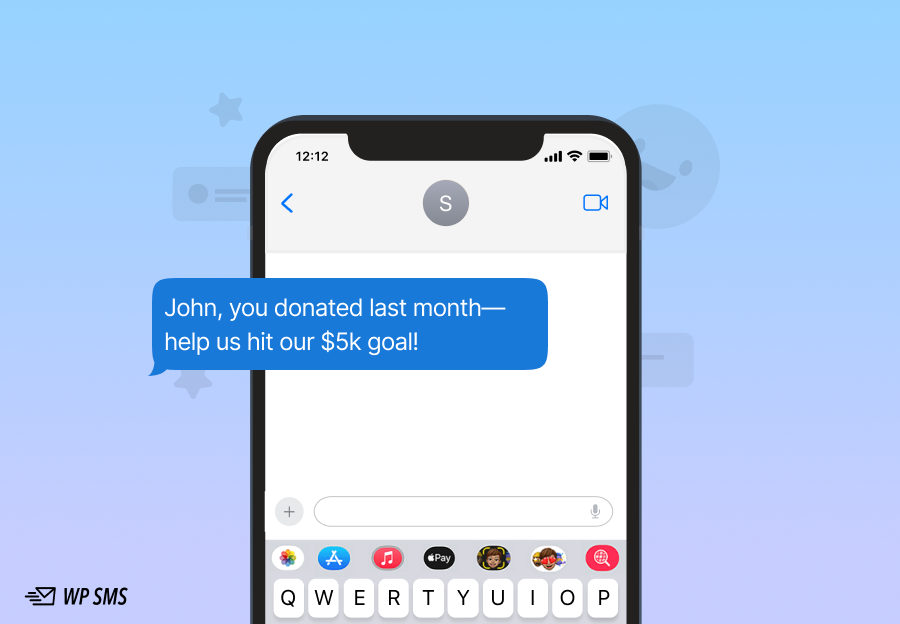
SMS Reminders for Voting
SMS reminders for voting reduce missed votes. Send timed alerts like, “Election Day is tomorrow! Bring your ID card.” These texts work because they are direct and impossible to ignore.
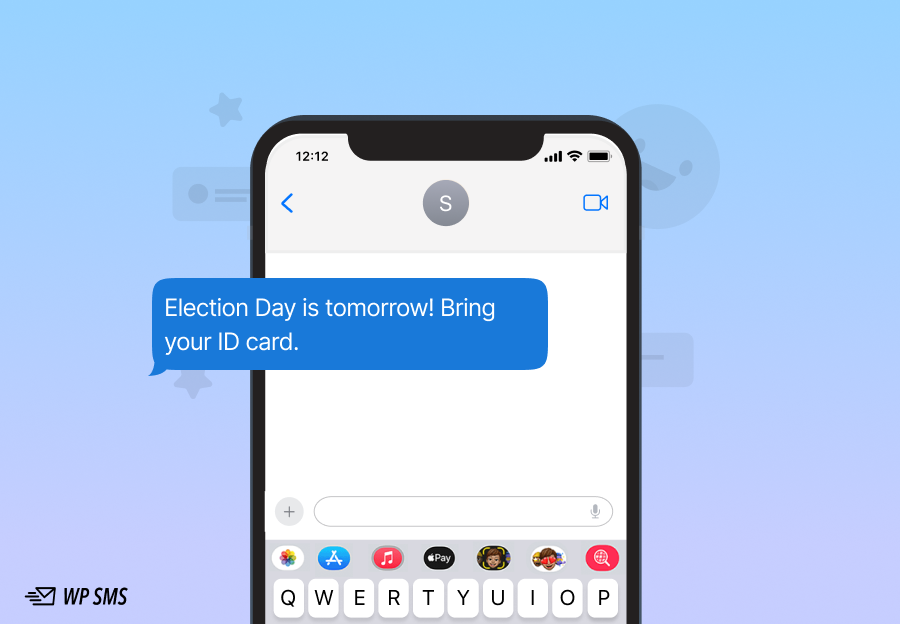
Use SMS for early voting deadlines, registration cutoffs, or last-minute polling location changes.
With WP SMS plugin, campaigns can schedule automated reminders weeks in advance and segment lists to target high-risk groups, like first-time voters.
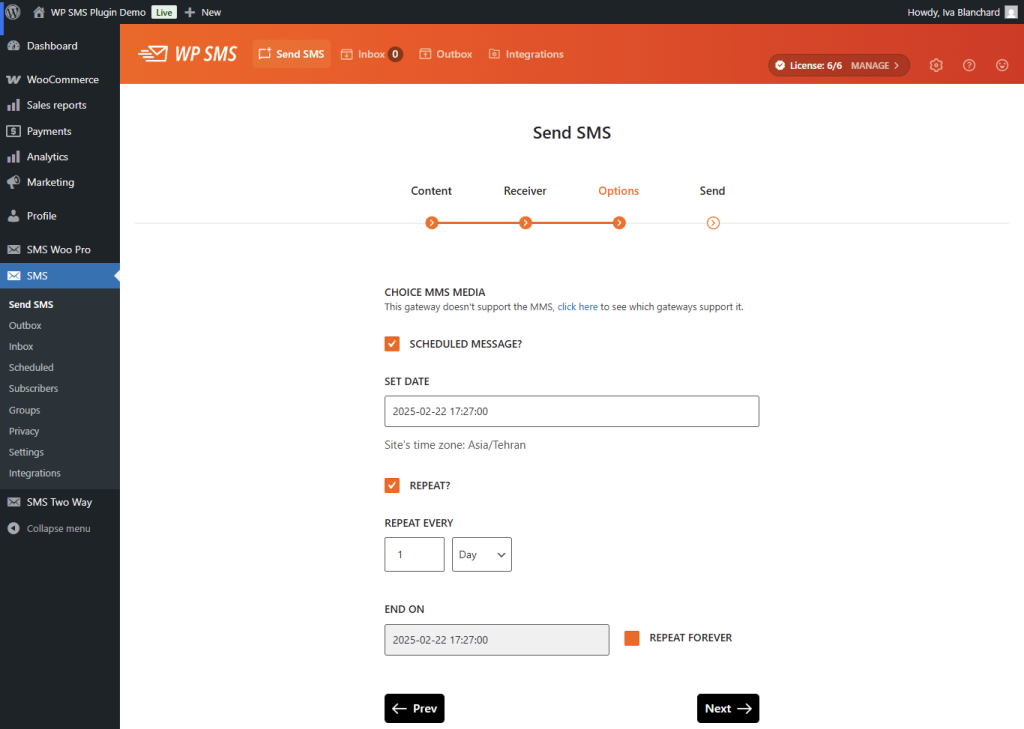
SMS Fundraising for Politicians
SMS fundraising turns texts into donation tools. Send clear calls to action: “Help us reach our goal! Donate $10 now: http://site.com/donate.” Track results to refine messaging and boost campaign budgets. Short, urgent texts drive quick responses.
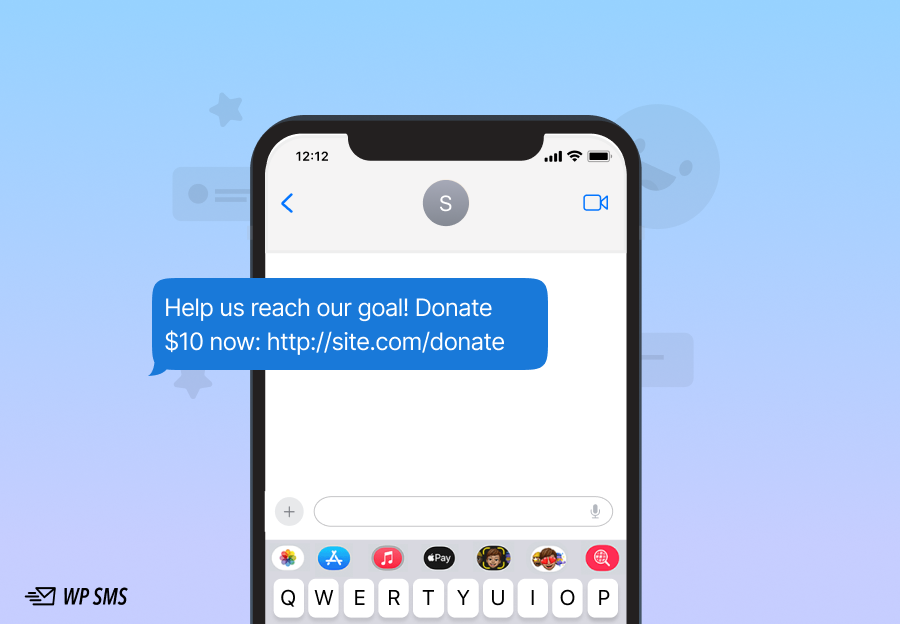
Political SMS Campaigns Best Practices
Running a successful political SMS campaign requires planning and respect for voters. Follow these guidelines to build trust, stay compliant, and drive results.
Ask for Consent
Always get explicit opt-in consent before sending texts. Use clear language like, “Text JOIN to 12345 for campaign updates.” This follows political SMS compliance laws and avoids spam complaints.
Never buy contact lists. Grow your subscriber list through sign-up forms on your website, event registrations, or volunteer sheets. Let voters know they can opt-out anytime by replying “STOP.”
Keep It Short and Actionable
SMS messages should be under 160 characters. Focus on one goal per text, like “Reply YES to volunteer” or “Donate here: https://site.com/donate.” Avoid jargon or long explanations.
Use simple, urgent language. For example, “Deadline tomorrow! Register to vote: https://site.com” Include clear steps so voters know exactly what to do next.
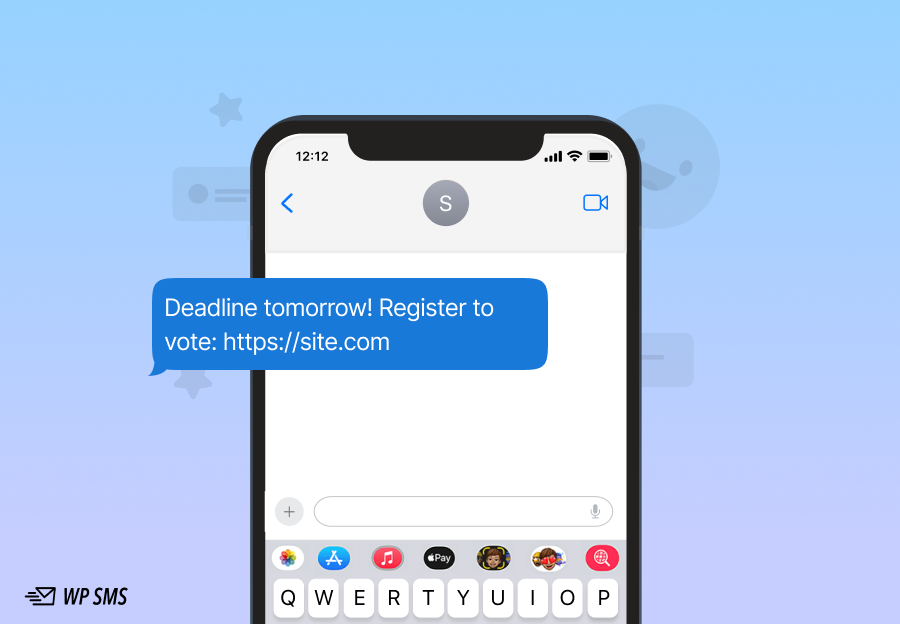
Time Messages Strategically
Send texts when voters are likely to read them—between 10 AM and 8 PM. Avoid weekends or late nights unless sharing urgent updates (e.g., polling location changes).
Schedule reminders a few days before key dates, like voter registration deadlines. Too early, and they will forget; too late, and it is ineffective.
Track Performance
Monitor open rates, click-throughs, and replies to see what works. If SMS reminders for voting have low engagement, test shorter messages or different timing.
Use A/B testing for phrasing. For example, compare “Election Day is Tuesday” vs. “Your vote matters—cast it Tuesday!” Adjust based on data.
Automate SMS Workflows
Set up automated texts for routine tasks, like welcome messages after opt-in or follow-ups after events. Automation saves time and ensures no voter is overlooked.
Use drip campaigns for voter education. Send a series of texts explaining your platform, spaced days apart. This keeps voters engaged without overwhelming them.
End with a Call-To-Action (CTA)
Every text needs a clear next step. Examples: “RSVP today: https://site.com,” “Reply VOLUNTEER,” or “Share this with friends.”
Make the CTA easy. Avoid multiple links or choices. A single action per text increases the chance voters will respond.
Examples of Effective Political SMS Campaigns
Political SMS campaigns drive real-world results by meeting voters where they are: on their phones. Below are proven examples of how SMS strategies work in action.
Local Candidate Boosts Turnout with Targeted SMS
A city council candidate in Austin, Texas, uses local political SMS to increase voter turnout. They send texts like, “Hi Mike, Don’t forget to vote on Tuesday! Your voice matters. Bring your ID!” By using targeted SMS campaigns, they can segment lists by neighborhood.

The campaign includes SMS reminders for voting two days before the election.
Voter Registration Drive via Mobile Outreach
A state political party runs a mobile voter outreach campaign. They send texts like, “Last day to register! Tap here to sign up: http://site.com/register.” The SMS reminders can include a short video tutorial on filling out forms.

Crisis Management with Real-Time Updates
During a campaign scandal, a mayor’s team uses crisis communication via SMS to rebuild trust. They send texts like, “We hear your concerns. Join our live Q&A tonight at 7 PM.” Replies can be managed via two-way political SMS, allowing voters to ask questions directly.
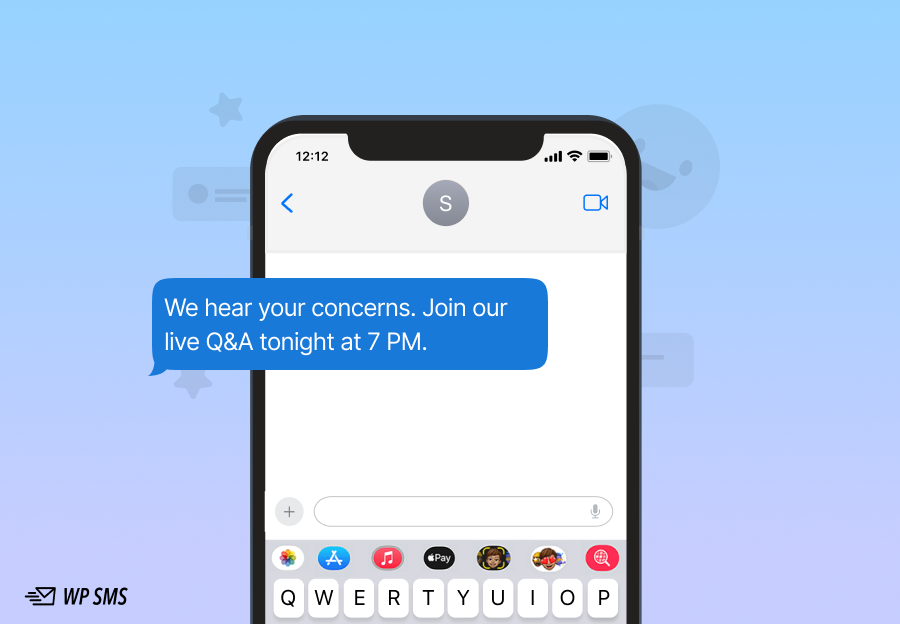
Fundraising Surge with Urgent Appeals
A congressional campaign uses SMS fundraising for politicians to meet a donation deadline. Texts says, “We’re 5k short-Helps us win! Donate now: http://site.com/donate.” They pair this with personalized SMS for voters, thanking past donors by name.

Youth Mobilization through SMS Polling
A governor’s campaign targets young voters with SMS polling for elections. They ask, “What’s your top issue? 1-Education, 2-Climate, 3-Jobs.” Follow-up texts share how their platform addresses these issues, which boosts youth turnout.

Last-Minute Rally Change via SMS Broadcast
A senatorial campaign faces a venue change hours before a rally. They use SMS broadcast to alert supporters: “URGENT: Rally moved to 123 Main St. at 6 PM. Share this!”

Conclusion
SMS for political campaigns has reshaped how candidates connect with voters. By using political text messaging, campaigns cut through the noise of emails and social media, delivering urgent updates, event invites, or policy details straight to voters’ phones.
Tools like WP SMS can be used for mass reach and two-way political SMS turns passive audiences into active participants. Whether it is SMS reminders for voting to boost turnout or SMS fundraising for politicians to meet goals, texts offer a direct path to engagement that is fast, affordable, and inclusive.
Success hinges on smart strategies. Campaign SMS strategies like personalized SMS for voters and targeted SMS campaigns build relevance by addressing local issues or voter concerns.
Following SMS compliance rules, such as SMS opt-in keeps campaigns ethical and trustworthy. Meanwhile, SMS polling for elections and crisis communication via SMS let candidates adapt quickly to voter needs or unexpected challenges. When done right, SMS is not just a tool, it is a bridge between politicians and the people they aim to serve, fostering trust and driving real results.
FAQs
Why is SMS effective for political campaigns?
SMS has a 98% open rate, making it one of the fastest ways to reach voters. Unlike emails or social media, texts work for all demographics, including seniors and rural voters. Messages like SMS reminders for voting or event alerts cut through digital noise instantly.
How do I comply with SMS campaign laws?
Follow SMS compliance rules: always get explicit opt-in consent (e.g., “Text JOIN to 12345”). Avoid spam lists and include opt-out instructions (e.g., “Reply STOP to unsubscribe”).
Can SMS increase voter turnout?
Yes. SMS reminders for voting have been shown to boost turnout. Timely alerts about polling locations, deadlines, or ID requirements reduce missed votes.
What are best practices for writing political SMS?
Keep it short: Stick to 160 characters.
Use clear CTAs: “Reply YES to volunteer” or “Donate here: http://site.com/donate.”
Personalize: Use voter names or local issues.
Time strategically: Send messages between 10 AM and 8 PM
How does two-way SMS work in campaigns?
Two-way political SMS lets voters reply to texts. For example, they might text “ISSUES” to receive a candidate’s policy positions.
Is SMS fundraising effective?
Yes. SMS fundraising for politicians uses urgent, concise asks: “We need $5k by midnight—donate now: http://site.com.” Pairing this with personalized SMS (e.g., thanking past donors) improves results.
How can I target specific voter groups?
Use targeted SMS campaigns to segment audiences by location, age, or interests. For example, send local political SMS about neighborhood issues to voters in specific zip codes.
How do I collect opt-ins for SMS campaigns?
Add sign-up forms to your website, event pages, or social media. Use clear language: “Get campaign updates via text!”
Can SMS help during a political crisis?
Yes. Crisis communication via SMS allows rapid updates (e.g., “Join our live Q&A tonight to discuss recent events”). Two-way SMS lets voters ask questions, rebuilding trust in real time.
Does SMS risk spamming voters?
Only if used improperly. Always respect SMS compliance rules: send only to opt-in lists and avoid excessive messaging. Voters appreciate relevant, timely texts.
